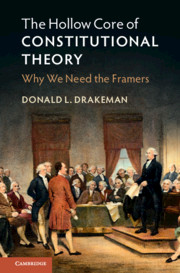Book contents
- The Hollow Core of Constitutional Theory
- The Hollow Core of Constitutional Theory
- Copyright page
- Contents
- Preface
- 1 The Framers and Contemporary Constitutional Theory
- 2 The Framers’ Intentions
- 3 Original Methods and the Limits of Interpretation
- 4 Original Methods Updating
- 5 The Semantic Summing Problem
- 6 Is Corpus Linguistics Better than Flipping a Coin?
- 7 The Framers’ Intentions Can Solve the Semantic Summing Problem
- 8 Interpretation and Sociological Legitimacy
- 9 Noninterpretive Decisions
- 10 Conclusion
- Bibliography
- Index
5 - The Semantic Summing Problem
Published online by Cambridge University Press: 26 January 2021
- The Hollow Core of Constitutional Theory
- The Hollow Core of Constitutional Theory
- Copyright page
- Contents
- Preface
- 1 The Framers and Contemporary Constitutional Theory
- 2 The Framers’ Intentions
- 3 Original Methods and the Limits of Interpretation
- 4 Original Methods Updating
- 5 The Semantic Summing Problem
- 6 Is Corpus Linguistics Better than Flipping a Coin?
- 7 The Framers’ Intentions Can Solve the Semantic Summing Problem
- 8 Interpretation and Sociological Legitimacy
- 9 Noninterpretive Decisions
- 10 Conclusion
- Bibliography
- Index
Summary
To determine the “will of the legislator,” William Blackstone pointed to “signs” of those intentions, the first of which is the words understood in their usual sense. This chapter will show the degree to which the words, even in context, have the potential to leave many important constitutional issues unresolved, hence the need for other evidence of the will of the lawmaker. In particular, this chapter will show that the “summing problem,” which has most often been associated with the difficulty of determining a single intention of the Framers, is matched by its semantic equivalent: the fact that the evidence of objective public meaning can lead to multiple potential meanings. To describe the problem, the chapter analyzes two clauses that have generated a great deal of litigation and interpretive controversy – the tax clauses and the Establishment Clause. In each case, there are multiple equally strong candidates for the objective public meanings of the words.
Keywords
- Type
- Chapter
- Information
- The Hollow Core of Constitutional TheoryWhy We Need the Framers, pp. 97 - 114Publisher: Cambridge University PressPrint publication year: 2021

